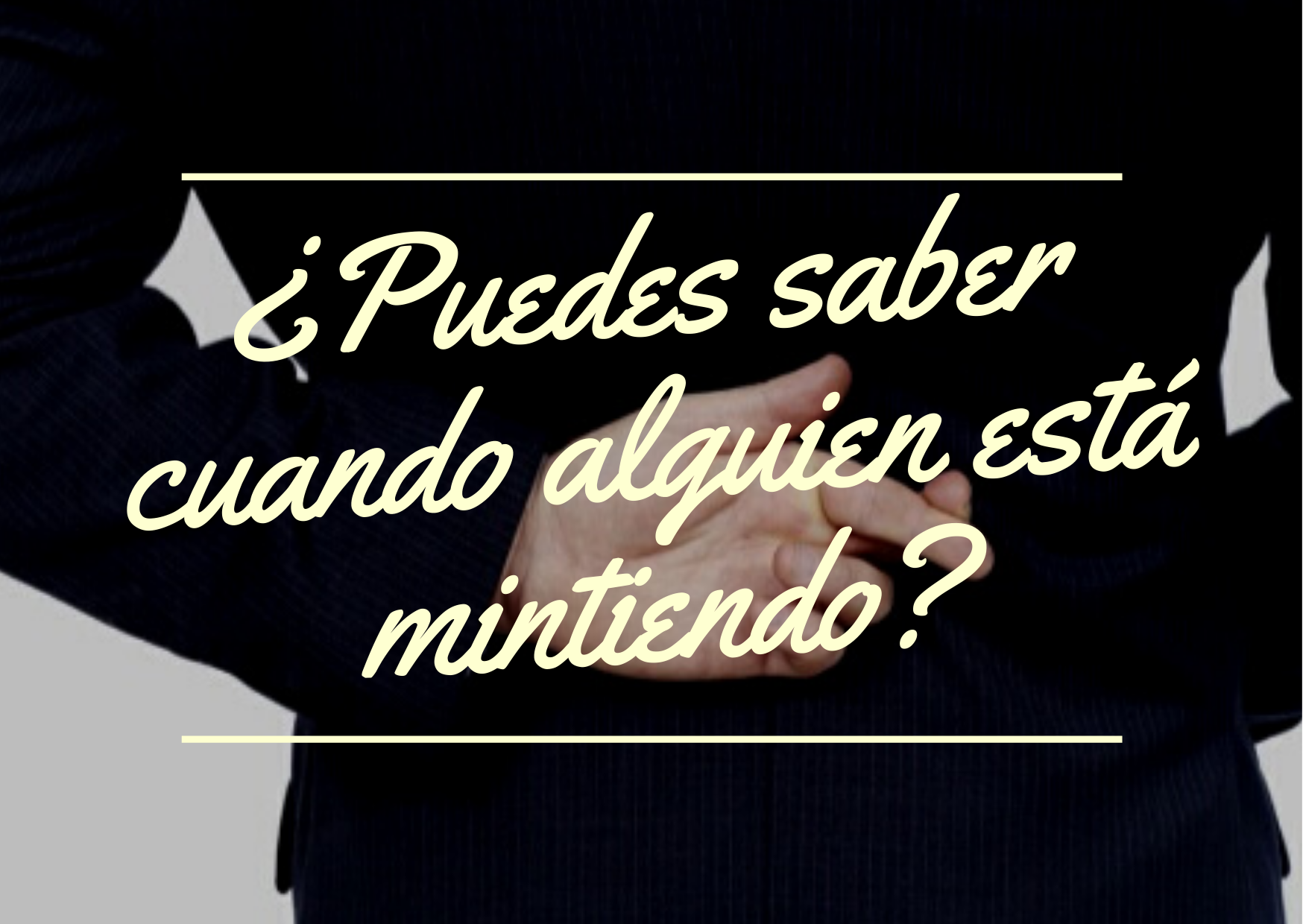
Si hace algo mal, probablemente crea que puede mantenerlo en secreto. Si alguien te pregunta por eso. Podrías mentir. Podrías creer que nadie podría sacarte tu secreto. Sin embargo, el hecho es que, en las condiciones adecuadas, la mayoría de nosotros confesaremos la verdad. Mi trabajo es crear esas condiciones. En una hora más o menos, puedo saber más sobre una persona que la mayoría de sus conocidos y compañeros de trabajo. En otra hora, sabré cosas que sorprenderían incluso a su familia.
Durante los últimos 12 años, he realizado miles de pruebas con detectores de mentiras. Mi experiencia me ha enseñado que las mentiras se pueden detectar con o sin el polígrafo. Las buenas habilidades de comunicación (saber escuchar y qué buscar) son las más importantes para leer lo que una persona realmente está diciendo. Aquí hay algunas cosas que he aprendido:
La parte más importante del examen es la entrevista previa a la prueba. Es durante esta conversación poco estructurada que el examinador aprende cómo es realmente la persona y se forma una opinión firme de si está mintiendo.
Todas las buenas entrevistas implican una observación atenta y una escucha concentrada. El examinador experto está atento a las pequeñas cosas que normalmente pasan desapercibidas: una ligera vacilación, un cambio en el tono de la voz, un movimiento corporal repentino.
La mayoría de la gente no escucha bien. Piense en la última persona con la que habló. ¿Cuánto recuerdas de lo que se dijo? Si la conversación ocurrió hace 3 horas y fue con un amigo, debes recordar casi todo, si estabas escuchando. La mayoría de nosotros preferimos hablar con alguien que nos escuche. Pero escuchar bien requiere esfuerzo.
Algunas palabras son más fáciles de escuchar que otras. Para captar la mentira, debemos estar atentos a las “palabras de helio” en la conversación, palabras como impuestos, sexo y dinero. Estas palabras hacen que nuestra concentración flote hacia una asociación personal. Para cuando hayamos regresado mentalmente, la conversación podría haber terminado.
Al menos el 40% de la mayoría de las conversaciones no son verbales. Los mensajes silenciosos, los movimientos, los gestos, los matices de la reacción, se pueden enviar tanto de forma natural como intencionada, con los mismos resultados. Una sonrisa, ya sea espontánea o artificial, provocará una respuesta más positiva que la mirada enojada. Un abogado defensor inteligente sabe cómo usar estos mensajes para ayudar a influir en un jurado: un niño puede usarlos para obtener una porción extra de postre. Un vendedor es particularmente hábil para enviar mensajes controlados durante una entrevista con uno. A menudo me encuentro en un duelo silencioso, cada uno de nosotros tratando de "manipular" al otro. He descubierto que la gente casi siempre revela inconscientemente su culpa a través del lenguaje silencioso, pero esto solo puede ser visto por aquellos que miran.
Lo que oye y lo que ve no siempre transmite el mismo mensaje. Una vez entrevisté a una mujer acusada de robar joyas de la caja fuerte de la empresa. Cada vez que le pregunté si decía "no", pero asintió con la cabeza "sí". Si no hubiera prestado atención a su lenguaje corporal, hoy estaría usando las joyas.
La prueba real del detector de mentiras se realiza después de la prueba previa. El instrumento de polígrafo registra cambios fisiológicos diminutos del sistema nervioso autónomo, cambios que ocurren cuando una persona miente. La frecuencia del pulso, la presión arterial y los latidos del corazón, así como los patrones de respiración y los cambios en la transpiración, se miden y transcriben en un gráfico móvil mientras se responden las preguntas. Esto luego se evalúa y califica de acuerdo con los estándares aceptados.
¿Por qué los culpables se someten a este descanso? Muchos, he descubierto, lo toman por el desafío. Cuanto más confiada la personalidad, más segura está la persona de su conquista del instrumento de diagnóstico. Pero si el examinador es bueno, el mentiroso no tiene muchas posibilidades. Aún así, debe haber una confesión. La mejor forma de obtener uno es mediante un interrogatorio o una "entrevista de poder".
Suponga que le dispara a alguien en el calor de la pasión y luego falla una prueba del detector de mentiras. ¿Te quedarías en tu silla para confirmar los resultados con una confesión? Nos gusta o pensamos que nos gustaría irnos. Sin embargo, por cada persona que se marcha, 20 optan por quedarse. La mayoría finalmente confiesa. Creo que la gente confiesa porque tiene el deseo de limpiar el alma. En realidad, es muy difícil mantener un secreto. Ocultar la verdad o mentir crea una cierta cantidad de presión y ansiedad dentro de una persona de la que está ansioso por ser aliviado. Sin embargo, no confesará a menos que se le dé la oportunidad.
Recuerdo a un hombre que falló la prueba del polígrafo por incendio provocado. Una hora después de la entrevista de poder, todavía no había admitido su culpa. No verbalmente, me estaba diciendo que quería confesar, pero no dijo las palabras. Decidí probar algo diferente. Le dije que habíamos llegado a un punto muerto e insistí en que se fuera. En menos de un minuto, regresó, se sentó y comenzó a hablar. Diez minutos después, confesó el incendio provocado y otros dos incendios recientes.
¿Podemos saber cuando alguien está mintiendo? ¡De manera inequívoca, sí !. Pero si bien identificar a un infractor de la ley es importante, tenemos la obligación moral de no violar la privacidad de una persona ni aprovechar su vulnerabilidad. Las “mentiras” son parte del tejido social y descubrirlas puede no ser siempre algo bueno. Incluso si pudiera, realmente no quiero conocer los pensamientos más íntimos de mi amigo. Hay algunos secretos que nunca deben compartirse.
If you do something wrong, you probably think you can keep it a secret. If someone asks you about it. You might lie. You might believe that no one could get your secret out of you. However, the fact is, under the right conditions, most of us will confess the truth. My job is to create those conditions. In an hour or so, I can know more about a person than most of their acquaintances and co-workers. In another hour, I will know things that would surprise even their family.
Over the past 12 years, I have conducted thousands of lie detector tests. My experience has taught me that lies can be detected with or without a polygraph. Good communication skills (knowing how to listen and what to look for) are the most important in reading what a person is really saying. Here are a few things I have learned:
The most important part of the exam is the pre-test interview. It is during this loosely structured conversation that the examiner learns what the person is really like and forms a firm opinion of whether they are lying.
All good interviews involve careful observation and concentrated listening. The skilled examiner is on the lookout for the little things that normally go unnoticed: a slight hesitation, a change in tone of voice, a sudden body movement.
Most people don't listen well. Think about the last person you spoke to - how much do you remember of what was said? If the conversation happened 3 hours ago and it was with a friend, you should remember almost everything, if you were listening. Most of us prefer to talk to someone who will listen. But listening well takes effort.
Some words are easier to hear than others. To catch the lie, we must watch for the "helium words" in the conversation, words like taxes, sex and money. These words cause our concentration to float toward a personal association. By the time we have mentally returned, the conversation may be over.
At least 40% of most conversations are nonverbal. Silent messages, movements, gestures, nuances of reaction, can be sent both naturally and intentionally, with the same results. A smile, whether spontaneous or artificial, will elicit a more positive response than an angry look. A savvy defense attorney knows how to use these messages to help sway a jury: a child can use them to get an extra slice of dessert. A salesperson is particularly adept at sending controlled messages during an interview with one. I often find myself in a silent duel, each of us trying to "manipulate" the other. I have found that people almost always unconsciously reveal their guilt through silent language, but this can only be seen by those watching.
What you hear and what you see does not always convey the same message. I once interviewed a woman accused of stealing jewelry from the company safe. Each time I asked her if she said "no," but she nodded her head "yes." If I hadn't paid attention to her body language, she would be wearing the jewelry today.
The actual lie detector test is taken after the pretest. The polygraph instrument records minute physiological changes in the autonomic nervous system, changes that occur when a person lies. Pulse rate, blood pressure and heartbeat, as well as breathing patterns and changes in perspiration, are measured and transcribed on a moving graph while questions are answered. This is then evaluated and scored according to accepted standards.
Why do culprits undergo this break? Many, I have found, take it for the challenge. The more confident the personality, the more certain the person is of his or her conquest of the diagnostic instrument. But if the examiner is good, the liar doesn't stand much of a chance. Still, there must be a confession. The best way to get one is by interrogation or a "power interview."
Suppose you shoot someone in the heat of passion and then fail a lie detector test. Would you stay in your chair to confirm the results with a confession? We either like it or think we'd like to leave. However, for every person who leaves, 20 choose to stay. Most eventually confess. I think people confess because they have a desire to cleanse the soul. In reality, it is very difficult to keep a secret. Hiding the truth or lying creates a certain amount of pressure and anxiety within a person that they are anxious to be relieved of. However, he will not confess unless given the opportunity.
I recall a man who failed an arson polygraph test. An hour after the power interview, he still had not admitted his guilt. Nonverbally, he was telling me he wanted to confess, but he didn't say the words. I decided to try something different. I told him we had reached an impasse and insisted that he leave. In less than a minute, he came back, sat down and started talking. Ten minutes later, he confessed to the arson and two other recent fires.
Can we tell when someone is lying? Unequivocally, yes. But while identifying a lawbreaker is important, we have a moral obligation not to violate a person's privacy or take advantage of their vulnerability. "Lies" are part of the social fabric and uncovering them may not always be a good thing. Even if I could, I really don't want to know my friend's innermost thoughts. There are some secrets that should never be shared.
